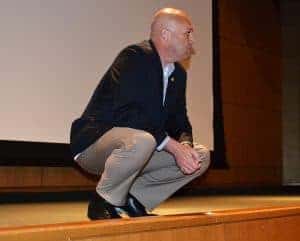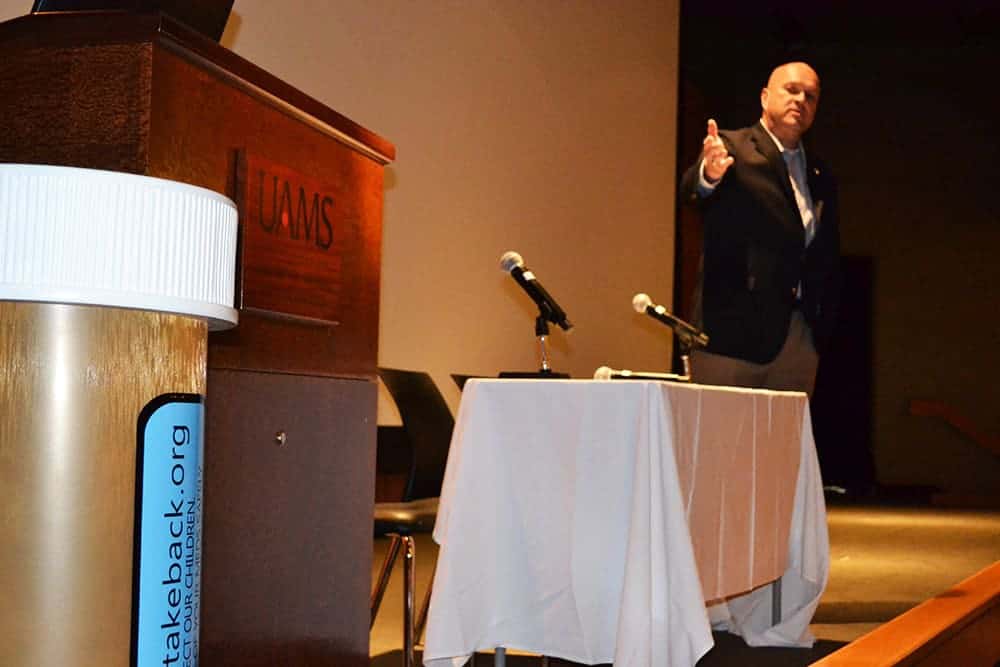Pain Management Symposium Speaker Discusses Opioid Crisis
| May 10, 2018 | Kirk Lane wasn’t pointing a finger at anyone in the audience at UAMS. He was pointing a finger at everyone.
Lane, director of the Arkansas Drug Task Force, spoke April 28 at the Arkansas Pain Management Symposium, focusing chiefly on the opioid crisis in the state and nationwide
“Inevitably, it all comes back to understanding our prescribing rates,” Lane said. “Many times, a doctor or prescriber comes back and says, ‘Why are you pointing the finger at me?’ I’ll be the first to tell you that I point the finger at everybody, even myself. As a career law enforcement professional, I didn’t do enough to understand the prescription drug problem. We worked hard fighting methamphetamine, cocaine and marijuana. We didn’t work very hard on prescription drugs.”

Erika Petersen, M.D., talks with one of the attendees during a break in the symposium schedule. Petersen made a presentation at the symposium about the newest technology in chronic pain treatment.
Lane served for more than 20 years in the Pulaski County Sheriff’s Office and was chief of police for the Benton Police Department from 2009 until his July 2017 appointment to lead the task force.
He outlined several initiatives the state is implementing to address the crisis, including a drug takeback program that has received and destroyed 131 tons of unused prescription drugs with the goal of keeping them from illicit use.
More than 400 Arkansans died from opioid overdose in 2016, and Lane said that number probably is actually twice the official count because of how overdose deaths are tracked in the coroner system.
Efforts are being made to correct those flawed reporting methods, so more accurate data can enable drug enforcement and treatment programs to target the areas of Arkansas with the heaviest opioid use and overdose risk.
Overprescribing of opioids is also a factor fueling the crisis. In 2016, there were 114.6 prescriptions for opioids for every 100 people in the state. That’s the equivalent of about 253 million opioid pills statewide, making Arkansas second in the nation for the number of doses per capita.
The Centers for Disease Control and Prevention (CDC) has set out prescribing guidelines, “and we’re working with the Medical Board to try to adopt those guidelines,” Lane said.
To equip first responders with what they need to prevent an opioid overdose death, the state has provided them with 3,300 naloxone kits. Naloxone is a nasal spray that can counteract the opioid in someone who has overdosed.
Because of the increasing presence of fentanyl in the United States and Arkansas, it’s important to get the naloxone kits into the hands of first responders. Fentanyl is an opioid 50 times stronger than heroin, Lane said, so the window of time in which someone can be treated with naloxone is much smaller than with other opioids.

Lane poured the contents of an artificial sweetener packet on the edge of the stage to simulate the volume of a single gram of the opioid fentanyl.
“What we should be doing is working together,” Lane said. “It’s not pointing a finger at doctors or big pharma. We all have to get involved. We also need to train people to help us fight this. If we don’t, we will be the first generation to not leave it better for the next generation. We already have seen a reduction in the average lifespan by 2.5 months.”
About 200 people — many of them physicians, n
urses and pharmacists — attended the daylong symposium, which was organized by the UAMS Office of Continuing Education, Johnathan Goree, M.D., and Christopher Paul, M.D. Goree is director of Pain Management Services at UAMS and an assistant professor in the College of Medicine Department of Anesthesiology. Paul also is an assistant professor in the Department of Anesthesiology.
Guest presenter Eugene Hillsman, Ph.D., spoke at the symposium about marijuana policy development, the drug as a subject of political controversy, and the impact of the War on Drugs on disadvantaged communities. Hillsman works for the San Francisco Office of Cannabis.
Nineteen speakers spoke or participated in 12 different presentations or panel discussions during the symposium, covering a range of topics from the newest innovations in neuromodulation to medical marijuana and new information from CDC and the Arkansas Department of Health.
